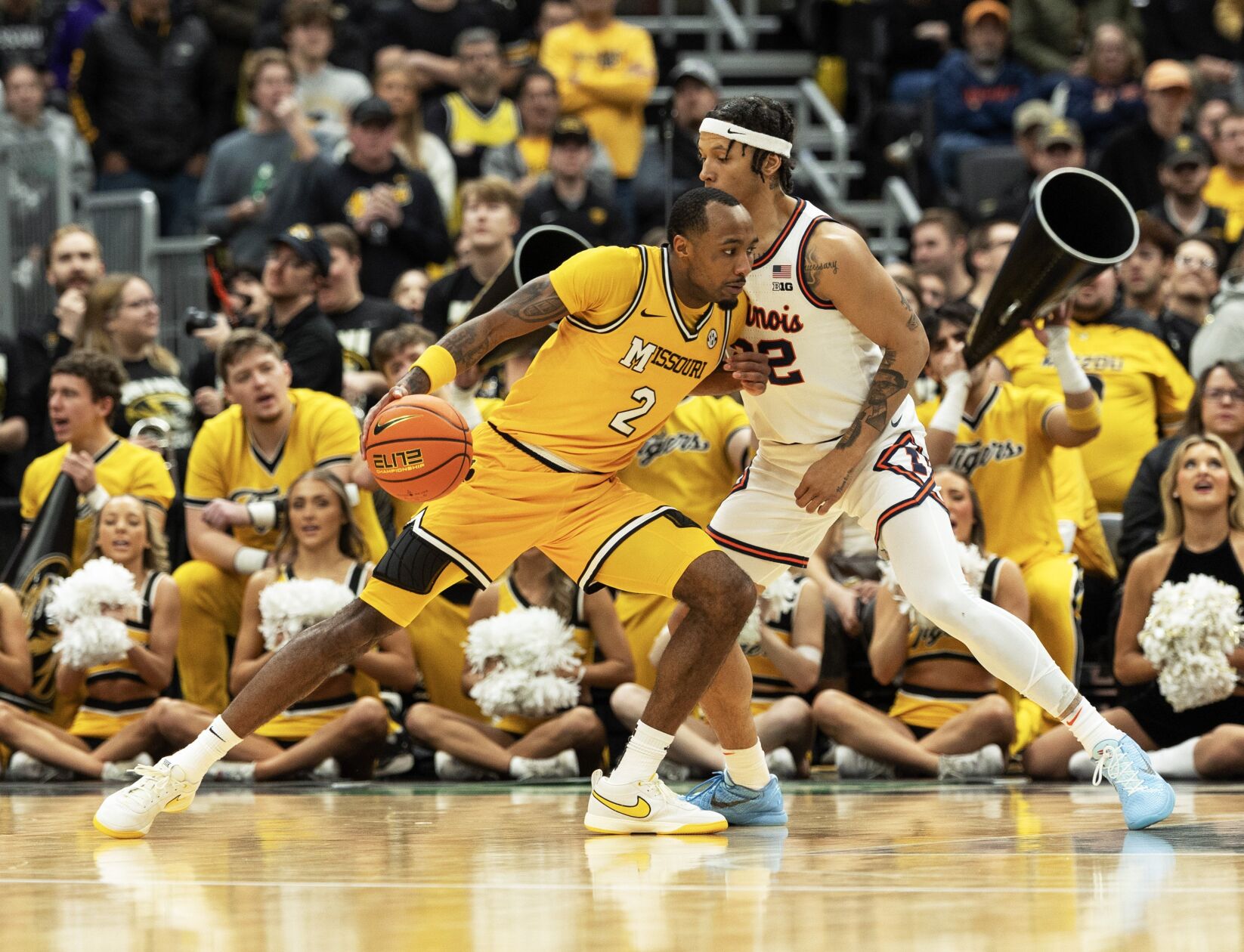COLUMBIA, Mo. — In 2023, Missouri men’s basketball signed five transfers. They were coach Dennis Gates’ second transfer portal haul at the program, intended to help the Tigers build off the NCAA Tournament appearance achieved in his debut season.
None of them had the clear markings of bona fide stars. A couple of them were seeking changes of scenery while others were trying to move up a level.
And in the 2023-24 season, they didn’t win a game against a Southeastern Conference opponent, posting an 8-24 record in one of Mizzou’s most dismal basketball campaigns ever.
Those struggles are well established at this point and at least loosely buried by a redeeming run back to the NCAA Tournament in 2024-25. This week’s NBA Draft, though, gives reason to re-examine that 2023 transfer class.
Two of them — center Connor Vanover and forward Jesus Carralero — are out of college basketball. Yet the other three have now signed contracts with NBA teams.
Guard Tamar Bates inked a two-way deal with the Denver Nuggets, while guard Caleb Grill earned a prove-it summer deal with the Chicago Bulls. The Utah Jazz drafted guard John Tonje — announced as a product of Wisconsin, where he spent his final collegiate season after transferring away from Missouri — in the second round.

Drake guard Kael Combs, right, tries to steal the ball from Missouri guard Tamar Bates during the second half of a first-round game in the NCAA tournament on Thursday, March 20, 2025, in Wichita, Kan.
Maybe it was player development that took place over the course of the 2024-25 season. That’s perhaps a factor, but given that injuries to two of those freshly minted pros were key blows to Missouri during the 23-24 season, signs point toward Gates having spotted their potential more than two years ago.
Bates had scored more than 20 points in a game just once in his two seasons at Indiana, coming almost exclusively off the bench as an omnipresent but rarely key piece of the Hoosiers’ rotation. His ninth game at Mizzou was his first start for the Tigers, and he wound up starting 59 over his two seasons in black and gold, averaging more than 13 points per game while shooting the ball efficiently.
MU unlocked something in Bates that Indiana hadn’t. His field goal percentage leaped up from 37% with the Hoosiers to 50.2% with the Tigers. His 3-point shooting climbed from 34.6% to 39.2%. He notched more rebounds and steals.
All of that led to Bates earning a contract with the Nuggets. No opportunity is guaranteed to the players who sign two-way deals, but he’ll at least get a shot.
Grill became one of the what-ifs of the 2023-24 season after he went down with a wrist injury during a December nonconference game. At the time, it didn’t look like a season-ender, but setbacks during the healing process ultimately kept him out for the rest of the year.

Mizzou guard Caleb Grill hugs head coach Dennis Gates on Saturday, March 8, 2025, after coming out the game against Kentucky at Mizzou Arena in Columbia, Mo.
When he returned for the 2024-25 season, he had become a better player. Compared to his three seasons at Iowa State and one at UNLV that came before his transfer to Mizzou, Grill put together his best collegiate campaign. He’d never shot better than 36.8% from beyond the arc at those schools but finished with a 39.6% clip in his final MU season. He also set career highs in field goal percentage, free-throw percentage, steals and scoring.
Tonje was also a what-if at Missouri. After emerging as one of the Mountain West’s best players in his fourth season at Colorado State, he wanted to give Southeastern Conference basketball a try.
After a preseason leg injury, however, Tonje played just 77 minutes in eight games at MU. He then transferred to Wisconsin, where he earned All-American honors by putting up 19.6 points and 5.3 rebounds per game.
Would he have been that type of player if he was healthy at Mizzou? Could Grill have had the kind of hot shooting run he enjoyed in early 2025 a year early? It’s impossible to say, though the Tigers would’ve certainly been better if either were healthy and came close.
Gates alluded to that at times during Missouri’s 19-game losing skid, trying to explain the effect of injuries without creating a mockable excuse.
“It’s almost like we have to play perfect basketball, especially with our injuries,” Gates said after one loss. “Our margin of error is very slim because of those situations we’re in.”
He was right. His team just wasn’t very good without two of the players who’ve gone on to sign professional contracts.
Does the number of pro deals outweigh the number of losses racked up that season? No, but they can help mellow out the perception of what went wrong for Mizzou in 2023-24. In terms of talent identification, anyway, Gates and the Tigers got at least one thing right.






















